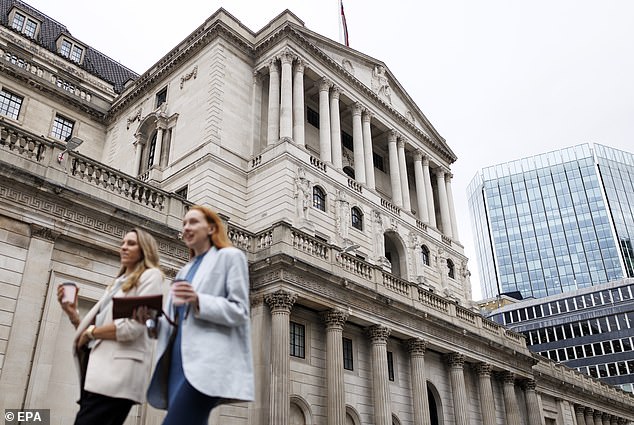The most fascinating takeaway from the Bank of England’s decision to hold the bank rate at 4 per cent, and the US Federal Reserve’s cut overnight, is the demand from dissenters for lower rates to support growth and jobs.
Objectors on the Bank’s interest rate- setting committee and at the Fed fear borrowing costs are being kept too high for too long.
No one uses the word recession but that is becoming a bigger risk than persistent higher prices.
The reasoning behind the votes by Monetary Policy Committee members Swati Dhingra and Alan Taylor, both academic economists, for a quarter-of-a-percentage cut are compelling.
Budgetary and tax uncertainties mean that consumer demand and business investment are subdued.
Global conditions are uncertain because of an average Trump tariff of 20 per cent. Trade data shows that UK physical exports are being hard hit with steel, aluminium and cars in the doldrums.

Cautious: The Bank of England’s rate-setting Monetary Policy Committee has decided to hold the base rate at 4%
Add two other factors. A long period of elevated mortgage rates together with Labour’s ill-judged withdrawal of stamp duty breaks on lower values homes is hammering the housing market.
The expansion of broad money – a measure of the total money supply in the economy – is benign. Consumer price rises are uncomfortably high at 3.8 per cent in the UK, with the prospect of 4 per cent next month.
But the disinflationary trend, barring some daft administered price rises in November’s Budget, means inflation should come down speedily.
Much of the excitable analysis focuses on the reduction in the volume of gilts which the Bank is injecting into the market from the inventory it built up through three shocks – the great financial crisis, Covid-19 and war in Europe.
As often is the case at an over-cautious Bank, the headline reduction from £100billion to £70billion of gilt sales is less than impressive.
The Bank is obsessed with the idea that it needs to reduce the scale of its balance sheet so that it is fully prepared to print money when the next crisis comes along.
It should look at other central banks and let its holdings run off over time and steer clear of the gilts market.
In a world where government was less in thrall to an independent Bank and the machinations of the Office for Budget Responsibility, the Chancellor Rachel Reeves would step in and say, ‘Enough!’.
Bond rates are elevated enough without further distortion by the Bank. Its adjustment is modest and unlikely to make any real impact on long rates.
Only decisive fiscal decisions to cut the size of the state or honest tax decisions, such as closing VAT loopholes or increasing the rate, will do that. Timidity precludes bold approaches to policy.
Fake friends
Much joy on Downing Street and in the media at the Trump visit pledge by private equity barons Blackstone to divert £100billion of investment into the UK.
How quickly people forget. Only a week ago Stephen Schwarzman, the multi-billionaire behind Blackstone, was found to be draining water supplies from the River Test and using tankers to fill a man-made lake on his Wiltshire estate.
The sense of entitlement, depriving Southern Water customers of resources, is a terrific metaphor for what Blackstone and the other private equity ghouls do.
Blackstone bought into Southern Cross care homes, stripped out and disposed of property assets and sold it in 2007, leading it to fall into administration.
Yet it has been allowed back into the UK, buying property assets, such as shared ownership homes, and gleefully selling them, with substantial gains.
Spare us the celebrations.
Risk-takers
Almost unnoticed is the City’s dominant role in the global insurance market.
Four years ago a small group of Lloyd’s underwriters, led by Richard Watson, set up Inigo, providing high-risk, data-driven products covering cyber, aviation warfare and mining.
US private mortgage insurer Radian was impressed and is buying it for £1.25billion, with the founders netting a paper profit of £515million.
Radian will provide the capital and Inigo the London headquarters, and expertise for a major expansion.
Good going!
DIY INVESTING PLATFORMS

AJ Bell

AJ Bell
Easy investing and ready-made portfolios

Hargreaves Lansdown

Hargreaves Lansdown
Free fund dealing and investment ideas

interactive investor

interactive investor
Flat-fee investing from £4.99 per month

InvestEngine

InvestEngine
Account and trading fee-free ETF investing
Trading 212
Trading 212
Free share dealing and no account fee
Affiliate links: If you take out a product This is Money may earn a commission. These deals are chosen by our editorial team, as we think they are worth highlighting. This does not affect our editorial independence.
Compare the best investing account for you
#Bank #England #stuck #slow #lane #time #bold #decisions #ALEX #BRUMMER
















